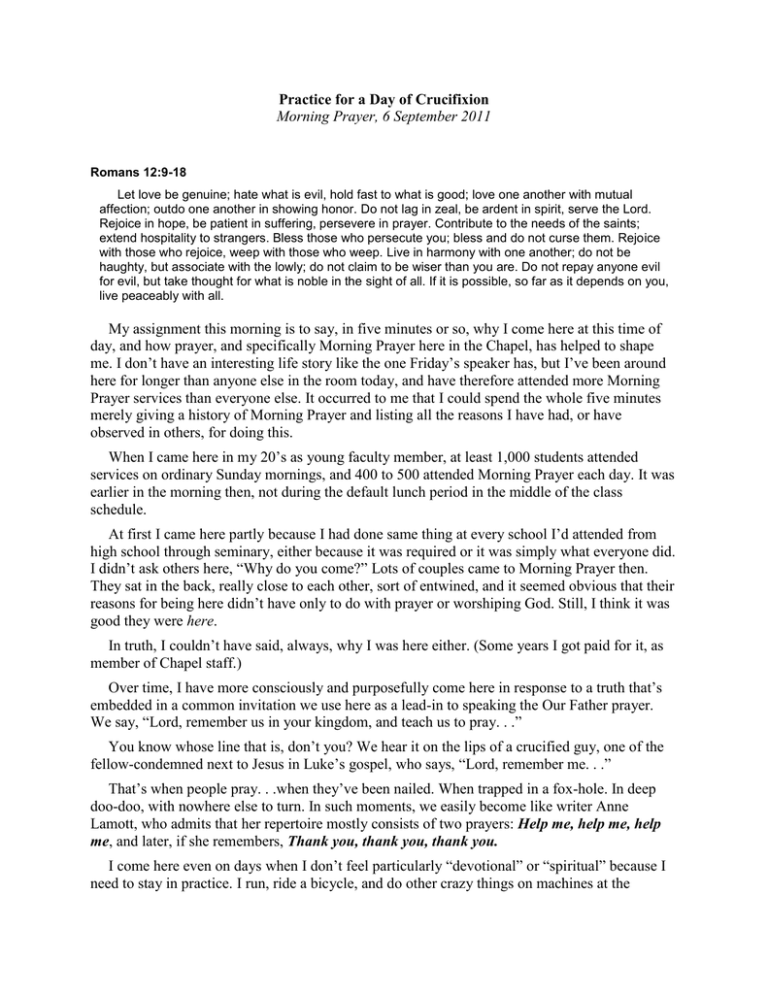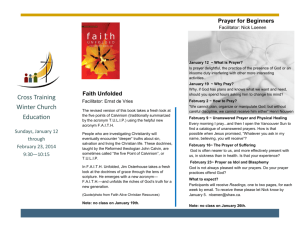Practice for a Day of Crucifixion Morning Prayer, 6 September 2011
advertisement

Practice for a Day of Crucifixion Morning Prayer, 6 September 2011 Romans 12:9-18 Let love be genuine; hate what is evil, hold fast to what is good; love one another with mutual affection; outdo one another in showing honor. Do not lag in zeal, be ardent in spirit, serve the Lord. Rejoice in hope, be patient in suffering, persevere in prayer. Contribute to the needs of the saints; extend hospitality to strangers. Bless those who persecute you; bless and do not curse them. Rejoice with those who rejoice, weep with those who weep. Live in harmony with one another; do not be haughty, but associate with the lowly; do not claim to be wiser than you are. Do not repay anyone evil for evil, but take thought for what is noble in the sight of all. If it is possible, so far as it depends on you, live peaceably with all. My assignment this morning is to say, in five minutes or so, why I come here at this time of day, and how prayer, and specifically Morning Prayer here in the Chapel, has helped to shape me. I don’t have an interesting life story like the one Friday’s speaker has, but I’ve been around here for longer than anyone else in the room today, and have therefore attended more Morning Prayer services than everyone else. It occurred to me that I could spend the whole five minutes merely giving a history of Morning Prayer and listing all the reasons I have had, or have observed in others, for doing this. When I came here in my 20’s as young faculty member, at least 1,000 students attended services on ordinary Sunday mornings, and 400 to 500 attended Morning Prayer each day. It was earlier in the morning then, not during the default lunch period in the middle of the class schedule. At first I came here partly because I had done same thing at every school I’d attended from high school through seminary, either because it was required or it was simply what everyone did. I didn’t ask others here, “Why do you come?” Lots of couples came to Morning Prayer then. They sat in the back, really close to each other, sort of entwined, and it seemed obvious that their reasons for being here didn’t have only to do with prayer or worshiping God. Still, I think it was good they were here. In truth, I couldn’t have said, always, why I was here either. (Some years I got paid for it, as member of Chapel staff.) Over time, I have more consciously and purposefully come here in response to a truth that’s embedded in a common invitation we use here as a lead-in to speaking the Our Father prayer. We say, “Lord, remember us in your kingdom, and teach us to pray. . .” You know whose line that is, don’t you? We hear it on the lips of a crucified guy, one of the fellow-condemned next to Jesus in Luke’s gospel, who says, “Lord, remember me. . .” That’s when people pray. . .when they’ve been nailed. When trapped in a fox-hole. In deep doo-doo, with nowhere else to turn. In such moments, we easily become like writer Anne Lamott, who admits that her repertoire mostly consists of two prayers: Help me, help me, help me, and later, if she remembers, Thank you, thank you, thank you. I come here even on days when I don’t feel particularly “devotional” or “spiritual” because I need to stay in practice. I run, ride a bicycle, and do other crazy things on machines at the YMCA because my body will atrophy and my arthritis will cripple me if I don’t. I need to stay in shape. Similarly, I pray with people like you partly because by this time in my life, I’ve been crucified a few times, so to speak, and I know I need to keep practicing prayer. Even if no crisis or tragedy overtakes me, I need to stay in shape, or better perhaps, I need to ask to be crucified, if I’m ever to do some of those things Paul bids his readers attend to in that lesson we heard a moment ago: Let love be genuine; hate what is evil. Bless those who persecute you. Live in harmony with one another; do not be haughty, but associate with the lowly; do not claim to be wiser than you are. Really? Here in the academic world, don’t claim to be wiser than I am? Ha! That requires repeated crucifixion. And when it comes, and I’m nailed, I needn’t invent any new words. They’re in my heart and on my lips. I’ve practiced them over and over, most often here. You’ve heard that story all your life if you’ve grown up among Christians. You’ve heard how Jesus did the same thing. The one who taught others to pray eventually found himself lying on the ground in Gethsemane, hoping against hope he wouldn’t have to drink the cup of torture and death he saw before him, praying the very prayer he taught: “Abba Father, thy will be done. . .” Later, on the cross, he spoke prayers he had learned as a kid and practiced all his life, including one that includes the line, “My God, my God, why?” and another with a verse that says, “Into your hands, I commit my spirit.” It doesn’t make much difference, really, why you come here, only that you come here, or somewhere where you find a way to practice, to stay in shape. Someday, you, too, will get nailed. Then, the words we’ve practiced here together will be ready. You won’t have to search for words. They’ll be there when you need them. And as you pray them, I promise you, even if you can’t see our faces in that moment, you’ll discover that you’re not alone. All the rest of us will be praying with you, and for you, just as everyone who had ever prayed those psalms Jesus prayed joined their voices to his as he cried out on the cross. When you pray, you, too, are in good hands. Frederick Niedner Morning Prayer, Chapel of the Resurrection, 6 Sept 2011 2




